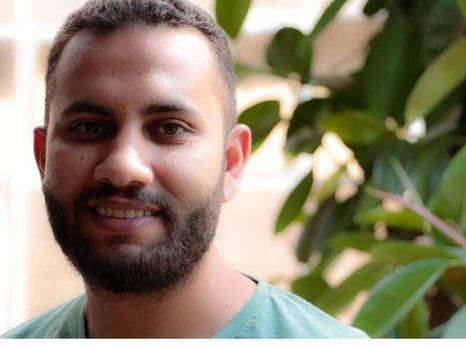Detained researcher in critical condition

Ibrahim is a researcher at the Egyptian Commission for Rights and Freedoms (ECRF), where he focuses on the right to housing. On the night of 11 June 2019, plainclothes Egyptian security forces arrested Ibrahim. He was taken from the street near his Cairo home in the area of Moqattam and was forcibly disappeared for 167 days.
Ibrahim Ezz El-Din first appeared in front of a prosecutor on 26 November 2019. According to his lawyer, he appeared physically weak and had lost a considerable amount of weight. He told the prosecutor that he was tortured during his incommunicado detention to extract information about his relationship to the ECRF, and about the organization’s work. He also complained about being held in inhumane and degrading conditions of detention at several security agency locations. Since then, the prosecutor has been extending his pre-trial detention every 15 days pending investigations.
He is the fifth person affiliated with the ECRF to have been arrested since 2016. His arrest follows the detention on 13 May 2019 of labour rights lawyer, Haytham Mohamdeen, who also works at ECRF, on trumped-up charges of “aiding a terrorist group”. In May 2018, Egyptian security forces arrested Amal Fathy, a human rights defender and wife of the Executive Director of ECRF and former Amnesty International Researcher Mohamed Lotfy, over a video critical of the authorities’ failure to address rampant sexual harassment. She was conditionally released in December 2018 and put under house arrest until 14 March 2020, when the Supreme State Security Prosecution lifted all precautionary measures imposed on her. In 2016, authorities had also arrested the ECRF Minorities Programme Director Mina Thabet and head of the board Ahmed Abdallah, before releasing them without charge.
Ibrahim Ezz El-Din has been unable to complete his master’s thesis as scheduled in December 2019 given his arrest. While Ibrahim’s lawyer obtained permission for Ibrahim to receive books in prison, he was prevented from writing his thesis by prison authorities.
Ibrahim’s arrest came amid a human rights crisis in Egypt, characterized by a crackdown on independent civil society and arrests of hundreds of individuals over their legitimate work or peaceful expression or assembly. The crackdown has affected journalists, football fans, critics, politicians and staff of civil society organizations. Many of those arrested have been subjected to enforced disappearances, before being charged with unfounded “terrorism” charges and held in pre-trial detention for months, or even years, without trial (see www.amnesty.org/en/documents/mde12/1399/2019/en/).
Amnesty International has documented Egyptian security forces’ use of enforced disappearances as a tool against political activists and protesters, including students and children in Egypt (see www.amnesty.org/en/documents/mde12/4368/2016/en/). Hundreds of people forcibly disappeared were held with no access to their lawyers or families and no external judicial oversight. This pattern of abuse became particularly evident after President Abdel Fattah al-Sisi appointed Major-General Magdy Abd el-Ghaffar as Minister of Interior in March 2015. ECRF is one of the main Egyptian NGOs that has been working extensively on the issue of enforced disappearances.